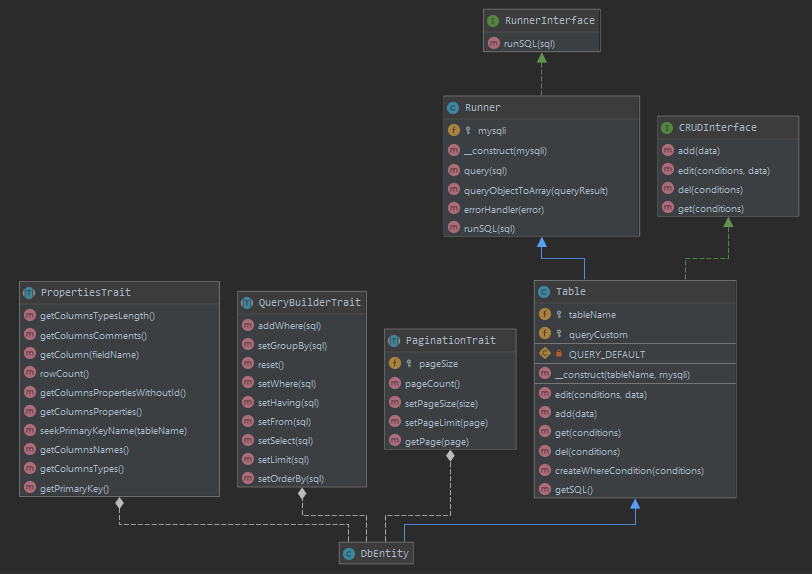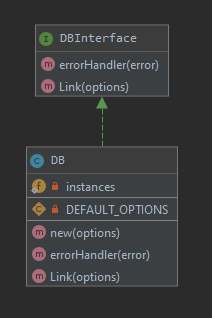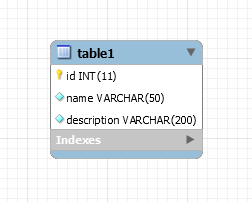texlab / mydb
The lightweight ORM for MySql and MariaDB
Installs: 465
Dependents: 1
Suggesters: 0
Security: 0
Stars: 1
Watchers: 1
Forks: 7
Open Issues: 2
pkg:composer/texlab/mydb
Requires
- php: ^7.1
- ext-mysqli: *
Requires (Dev)
- phpstan/phpstan: ^0.12
- phpunit/phpunit: ^7.5
- squizlabs/php_codesniffer: 3.*
- vimeo/psalm: ^3.0
This package is auto-updated.
Last update: 2026-02-08 10:22:47 UTC
README
MyDB
- Install
- Class diagram
- Database for examples
- Usage example
- CRUD
- Query builder
- Error handling
- Pagination
Install via composer
Command line
composer require texlab/mydb
Example composer.json file
{
"require": {
"texlab/mydb": "^0.0.5"
}
}
Class diagram
Database for examples
CREATE DATABASE IF NOT EXISTS `mydb`; USE `mydb`; CREATE TABLE IF NOT EXISTS `table1` ( `id` int(11) NOT NULL AUTO_INCREMENT, `name` varchar(50) NOT NULL, `description` varchar(200) NOT NULL, PRIMARY KEY (`id`) ) ENGINE=InnoDB DEFAULT CHARSET=utf8;
Usage example
<?php require 'vendor/autoload.php'; use TexLab\MyDB\DbEntity; use TexLab\MyDB\DB; $link = DB::link([ 'host' => 'localhost', 'username' => 'root', 'password' => '', 'dbname' => 'mydb' ]); $table1 = new DbEntity('table1', $link); echo json_encode($table1->get());
CRUD
Adding data:
$table1->add([ 'name' => 'Peter', 'description' => 'Director' ]);
Reading data:
$table1->get();
or a row with the given id
$table1->get(['id' => 3]);
Updating data:
$table1->edit(['id' => 2], [ 'name' => 'Alex', 'description' => 'Manager' ]);
Data deletion:
$table1->del(['id' => 1]);
Custom queries
echo json_encode($table1->runSQL("SELECT * FROM table1"));
Query builder
echo json_encode( $table1 ->reset() ->setSelect('id, name') ->setWhere("name like 'A%'") ->get() );
$table1 ->reset() ->setSelect('name, description') ->setWhere("description = 'Manager'") ->setOrderBy('name'); echo json_encode( $table1->get() ); $table1->setSelect('*'); echo json_encode( $table1->get() );
Error handling
<?php require '../vendor/autoload.php'; use TexLab\MyDB\DB; use TexLab\MyDB\Runner; $runner = new Runner( DB::link( [ 'host' => 'localhost', 'username' => 'root', 'password' => 'root', 'dbname' => 'test_db' ] ) ); $runner->setErrorHandler( function ($mysqli, $sql) { //put your error handling code here print_r([$mysqli->error, $mysqli->errno, $sql]); } ); $runner->runSQL("SELECT * FROM unknown_table");
Result:
Array
(
[0] => Table 'test_db.unknown_table' doesn't exist
[1] => 1146
[2] => SELECT * FROM unknown_table
)
Pagination
echo $table1 ->setPageSize(2) ->pageCount();
echo json_encode($table1->setPageSize(2)->getPage(1));



